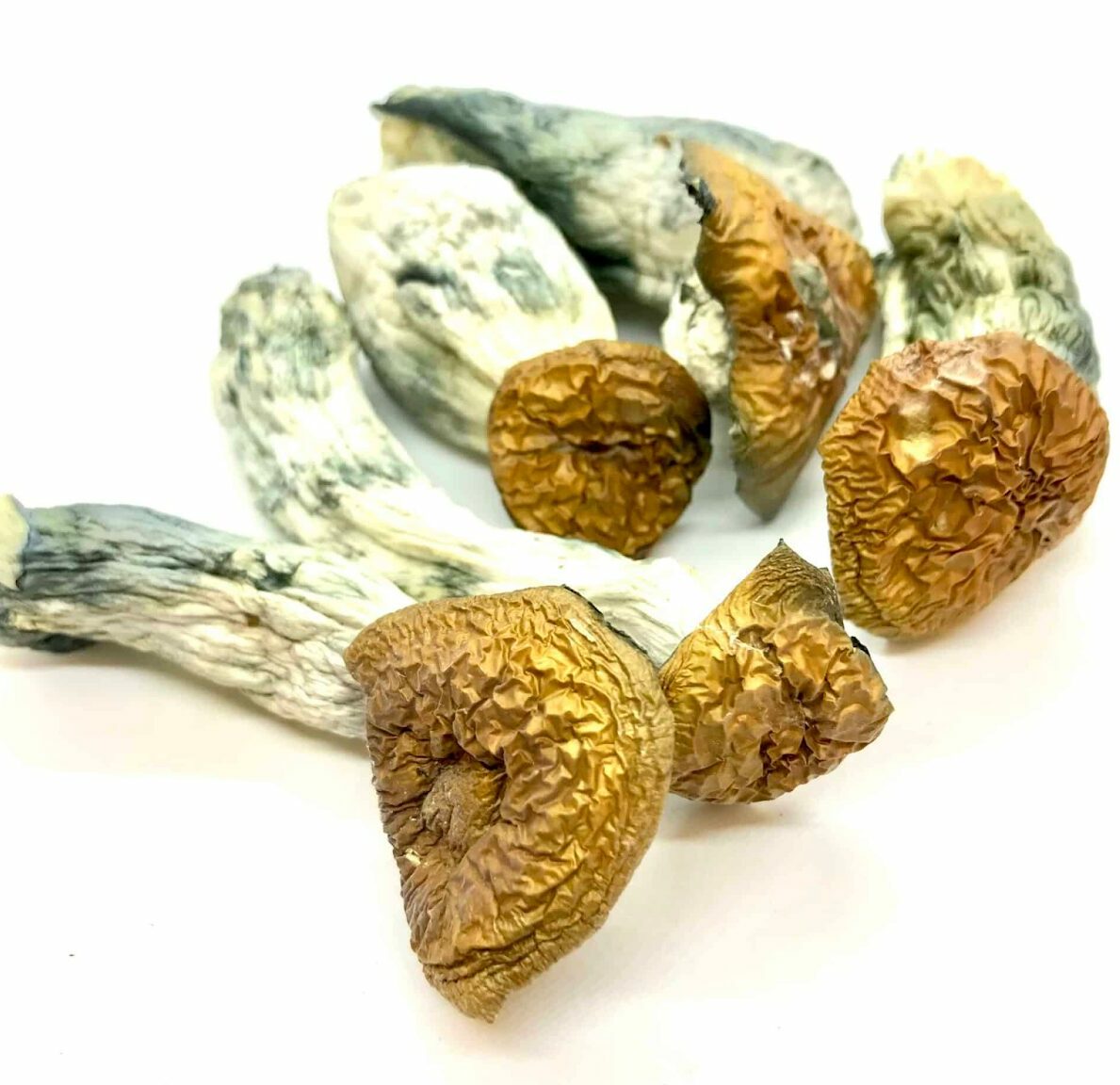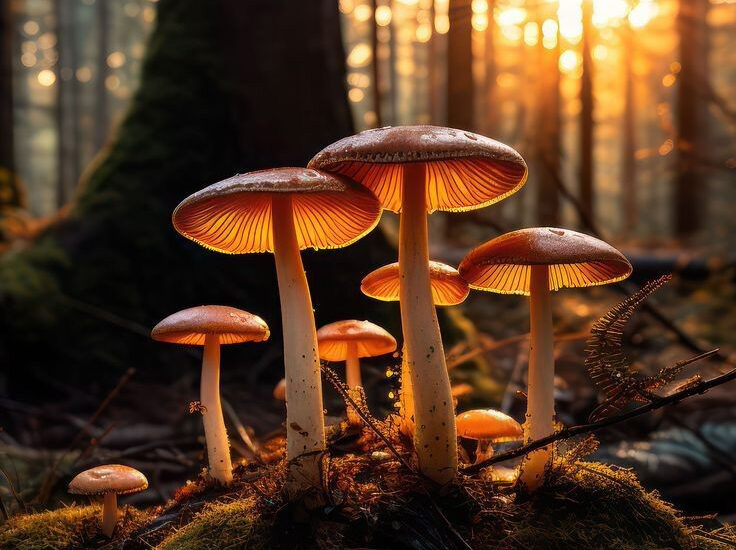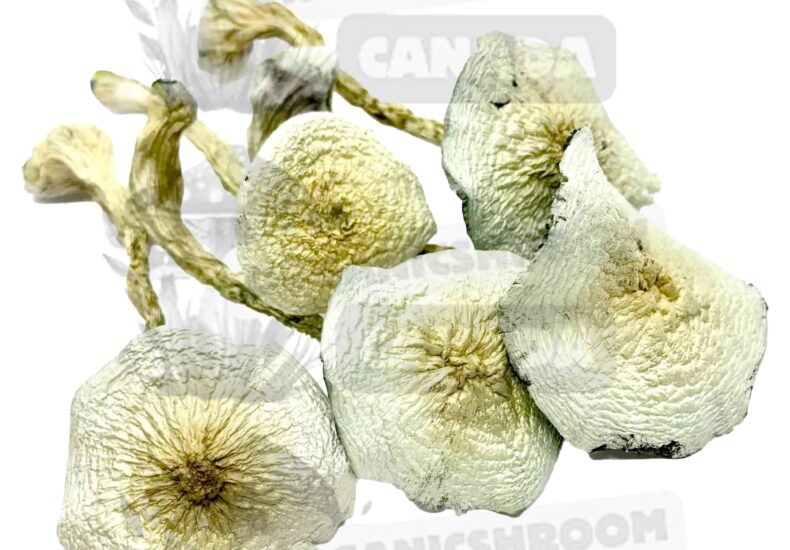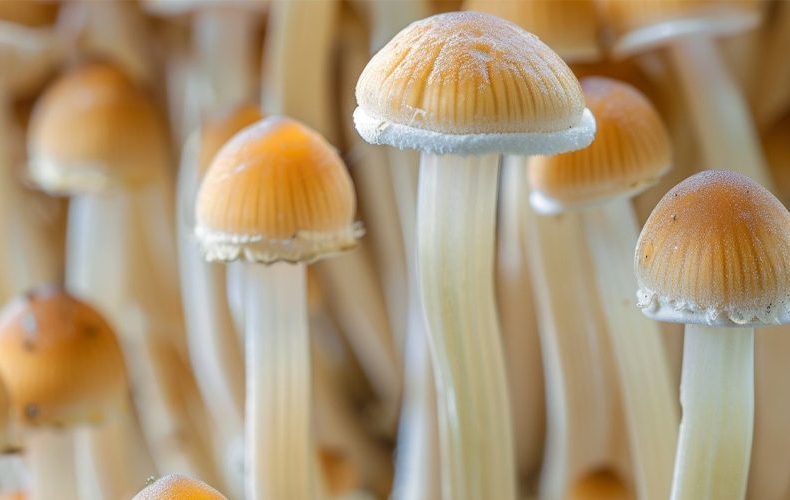
Feeling down or anxious can be tough. Psilocybin shows promise for mental health issues. This blog explores the Makilla Gorilla mushroom strain, offering insights into its effects and benefits.
Key Takeaways
- Makilla Gorilla magic mushrooms are a blend of Melmac Penis Envy and APE, known for their size, blue bruising, and high psilocybin content.
- Psilocybin works by activating serotonin receptors in the brain, changing mood and perception. It can lead to profound experiences and is studied for treating mental health issues like depression and anxiety.
- Side effects of using Makilla Gorilla mushrooms include nausea, vomiting, confusion, and potential risks like hallucinogen persisting perception disorder (HPPD). Safety is paramount when considering them for therapeutic purposes.
- User experiences often describe transformative insights and improvements in mental well-being. Concerns over “bad trips” highlight the need for a safe environment and possibly having a sober support person during use.
Overview of Makilla Gorilla Magic Mushrooms
The Makilla Gorilla magic mushrooms are a potent and distinctive strain with unique characteristics. Its effects are well-documented and widely recognized by users and researchers alike.
Description and identification
Makilla Gorilla magic mushrooms stand out for their impressive size and unique features. They grow into large, fist-sized mushrooms that catch the eye. Their stems are pale and colorless, a stark contrast to the light golden brown caps on top.
One key sign of their high psilocybin content is heavy blue bruising visible on the stems. This trait not only makes them easily identifiable but also indicates their potency.
The beauty of Makilla Gorilla lies in its distinct characteristics – from its sizeable appearance to the vivid blue markings signaling a rich psilocybin presence.
These organic shrooms come from combining two potent strains: Melmac Penis Envy and APE (Albino Penis Envy). This blend results in mushrooms that promise an experience full of depth and intensity.
Buyers can find these magic mushrooms available through various dispensaries or by choosing to buy shrooms online for convenience.
Potency and typical effects
Makilla Gorilla magic mushrooms are very powerful. They produce effects quickly, in about 20 minutes, and these last between four to six hours.
The intensity of the experience depends on the amount one takes. A Microdose (0-0.25g) brings subtle changes, hardly noticeable but still there. Step up to a Macrodose (0.25-0.5g), and you might notice your coordination and mood start to shift in interesting ways.
Taking a Light Dose (0.5-1g) kicks things into higher gear with more pronounced psychedelic sensations that can alter your sense of reality. For those looking for deep conversations or a strong feeling of connection, a Common Dose (1-2g) is often perfect; it’s when many feel a body high that envelops them gently but insistently.
Adventure seekers aiming for full-blown psychedelic journeys go for Strong Doses (2.5-5g), leading to classic hallucinogenic trips filled with vivid colors and patterns that dance behind closed eyelids—or even ego-death at Heroic Doses (5g+).
Regardless of how much one decides to take, exploring the landscape of your consciousness can be both profound and therapeutic when approached with respect for the mushroom’s potency.
Now let’s look into how psilocybin interacts within the brain after consumption.
How Psilocybin Works in the Brain
Psilocybin interacts with neurotransmitters in the brain, affecting mood and perception. It may have therapeutic potential for mental health conditions.
Interaction with neurotransmitters
Psilocybin has a special way of working in the brain. It activates serotonin receptors, which are like tiny buttons that control our feelings and thoughts. The main receptor it works on is called the serotonin 5-hydroxytryptamine 2A receptor or simply the 5HT2a receptor.
This action can change how we see, feel, and think about the world around us.
Magic mushrooms have the power to shift our mental state by interacting with parts of the brain responsible for our emotions and perceptions.
This process can lead to both fascinating and intense experiences. Users often report feeling more open, connected, and alive during their psychedelic trip. These changes are why researchers are studying psilocybin for treating mental health problems like depression and anxiety disorders.
Its ability to deeply affect how we feel makes it both a subject of fascination and an important tool for medical treatment research.
Impact on mood and perception
After learning how psilocybin interacts with neurotransmitters, it’s vital to explore its effects on mood and perception. Psilocybin can deeply change what people feel and notice around them.
Users often experience a range of emotions from extreme happiness to deep fear. This happens because the substance affects the brain parts that handle our feelings and how we see things.
These shifts in mood and perception lead to distortions in seeing colors, hearing sounds, or feeling time pass by differently than usual. Some may lose touch with reality, not sure where they are or what is happening around them.
This altered state can either be enlightening or frightening, impacting mental health conditions like depression or anxiety positively or negatively. People seeking therapeutic benefits from psilocybin mushrooms should do so under a healthcare professional’s guidance to manage these intense experiences safely.
Therapeutic Uses of Psilocybin
Psilocybin is used to treat depression, anxiety, and also has potential in palliative care. It’s a new hope for mental health treatment.
Treatment for depression and anxiety
Psilocybin is being investigated for its potential to treat depression and anxiety. Studies have shown promising results, with renewed interest in using psilocybin to address these mental health disorders.
Research has indicated that psilocybin therapy may have a positive impact on individuals suffering from depression and PTSD. Studies show that the therapeutic use of psilocybin could offer new possibilities for those struggling with psychiatric disorders.
Psilocybin therapy may hold promise as a treatment for depression and PTSD, offering hope for those battling these mental health challenges.
Potential in palliative care
Psilocybin, derived from magic mushrooms, shows promise in palliative care by alleviating anxiety related to illness and end-of-life. Research indicates its potential for effectively managing pain and neurodegenerative disorders in terminally ill patients.
The substance is being explored as a therapeutic option due to its ability to provide relief from psychological distress and improve the quality of life for individuals facing serious illnesses.
These findings open up new avenues for addressing the emotional and physical challenges encountered in palliative care settings, offering hope for enhanced comfort and well-being during this vulnerable phase.
Understanding the Effects of Psilocybin
Psilocybin can cause short-term psychological effects in users, such as visual and auditory alterations. Some users may also experience long-term changes in their attitudes and moods after using psilocybin-containing mushrooms.
Short-term psychological effects
Psilocybin swiftly alters perception and mood, leading to vivid hallucinations and a heightened sense of euphoria. It can induce a range of emotions, from calmness to intense emotional experiences.
Users often report feeling more connected to their surroundings or experiencing a shift in time perception. However, these effects are subjective and may vary widely among individuals who ingest Makilla Gorilla magic mushrooms.
Furthermore, individuals might also experience physical discomfort such as nausea, vomiting, confusion, or agitation following the consumption of psilocybin. These short-term impacts highlight the need for careful consideration before using this substance for recreational or therapeutic purposes.
Understanding these psychological and physical responses is crucial when evaluating the potential benefits and risks associated with psilocybin use.
Long-term changes in users
Users of psilocybin may experience long-term changes, including increased openness and connectedness. Research shows that a single dose can lead to enduring personality changes, with individuals reporting higher levels of openness months after ingestion.
This highlights the potential for lasting psychological effects on users’ personalities.
Furthermore, studies have found that psilocybin can disrupt the default mode network in the brain, leading to sustained alterations in thought patterns and self-awareness. These long-term changes underscore the need for careful consideration of potential psychological implications when using this substance.
Additionally, ongoing research on therapeutic uses of psilocybin suggests its promising role in promoting lasting positive shifts in mental well-being.
Safety and Risks
Makilla Gorilla mushrooms carry potential risks and safety considerations. Understanding the possible physical side effects and mental health implications is crucial when exploring their use.
Physical side effects
Psilocybin’s physical side effects can include agitation, confusion, vomiting, and nausea. These effects can be severe in people with heart conditions. It is important to note the potential dangers these side effects present, particularly for individuals with underlying heart issues.
Hallucinogen Persisting Perception Disorder (HPPD)
Hallucinogen Persisting Perception Disorder (HPPD), also known as flashbacks, is a rare but possible condition where individuals experience sudden and repeated recurrences of sensory disturbances.
These disturbances are reminiscent of those experienced during a previous hallucinogenic drug use, such as with psilocybin-containing mushrooms or LSD. Symptoms may include visual changes like halos around objects, difficulty focusing on small details, or seeing false motion in the peripheral vision.
Auditory symptoms can manifest as hearing echoes or sounds that aren’t there. While clinical settings report low risk for mental health issues like psychosis and suicidality, these risks increase outside regulated environments.
Considerations for mental health
When considering the use of psilocybin for mental health, it’s vital to prioritize safety. Seek guidance from healthcare professionals before using psychedelics, especially if you have a history of mental illness.
Additionally, be cautious about the potential risks and seek support from counselors or addiction specialists if needed. It is advisable to navigate this realm with professional supervision and tailored support.
User Experiences and Testimonials
Discover compelling personal stories and reported benefits of Makilla Gorilla Magic Mushrooms, along with common concerns and how to address them. Hear firsthand experiences from individuals who have explored the effects of this unique strain.
Personal stories and reported benefits
Users have reported profound personal insights and spiritual experiences after consuming Makilla Gorilla magic mushrooms. Some have described the mushroom’s effects as transformative, leading to a greater sense of interconnectedness and purpose in life.
Others claim that it has helped them manage stress and anxiety more effectively, resulting in an overall improvement in their mental well-being. In addition, individuals who have experimented with microdosing psilocybin have reported heightened creativity, improved focus, and enhanced mood regulation.
These anecdotal accounts highlight the diverse potential benefits of Makilla Gorilla magic mushrooms, from spiritual enlightenment to mental health enhancement.
Common concerns and how to address them
Many people worry about experiencing a “bad trip” when using magic mushrooms. This can cause extreme fear, anxiety, panic, or paranoia. To address this concern, it’s crucial to ensure that the environment is safe and comfortable for the user.
Additionally, having a trusted and sober individual present can provide reassurance and support throughout the experience.
There is also a risk of misidentifying toxic mushrooms, which can lead to severe poisoning. It’s essential for individuals to educate themselves on how to accurately identify the Makilla Gorilla Magic Mushroom strain or seek guidance from experts at reputable dispensaries to prevent any mishaps.
This knowledge reduces the risk of consuming harmful substances inadvertently while seeking therapeutic benefits from psilocybin-containing mushrooms.
Conclusion
Unlocking the Magic of The Makilla Gorilla mushroom strain has revealed its potent effects and therapeutic potential. Psilocybin in these mushrooms interacts with neurotransmitters to impact mood and perception, showing promise in treating depression and anxiety.
Despite safety considerations, user experiences are a testament to its benefits. As research into the magical properties continues, Makilla Gorilla stands as a fascinating entity in the realm of hallucinogenic substances.


